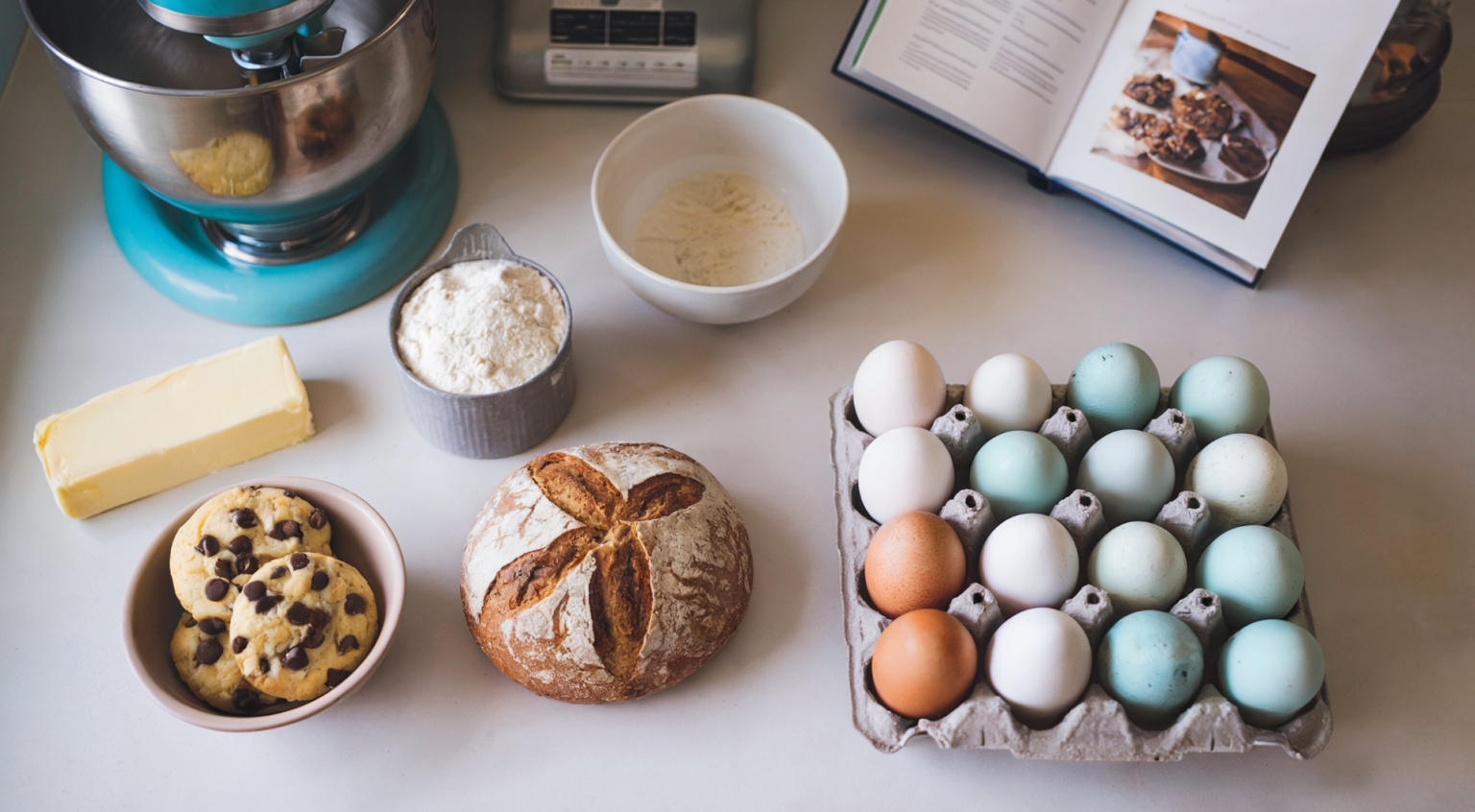Duck eggs are stepping into the culinary spotlight as a rising star in the baking world. With their larger size and distinct properties, they offer something that chicken eggs simply can’t replicate.
From cakes to custards, moist breads and decadent desserts, duck eggs provide bakers with rich flavor, unique textures, and structural integrity that transforms baked goods into something extraordinary.
Duck eggs are quickly earning a reputation as a powerhouse ingredient that enhances even the simplest of recipes. There are even some surprising added health benefits!
What Makes Duck Eggs Different Than Chicken Eggs?
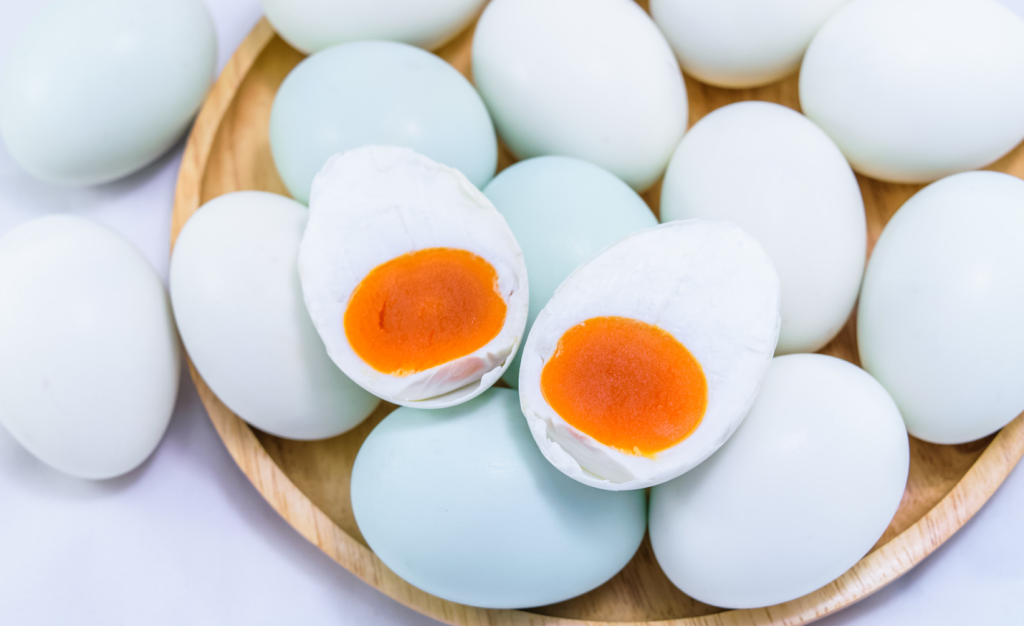
Duck eggs have a unique makeup that sets them apart from chicken eggs. They are typically 20-30% larger, with thicker shells and a yolk that boasts a deep golden color.
With a higher yolk-to-white ratio, more fat, and protein, they enhance baked goods with richness, earthiness, and a buttery quality. Their fat adds moisture and tenderness, while the protein supports loft and volume, resulting in fluffier, high-rising cakes and breads. This makes them ideal for delicate pastries that benefit from a soft, airy texture.
Thicker shells give them a longer shelf life, and their protein content enhances structure. This chemistry also helps bind ingredients more effectively, making duck eggs an exceptional choice for gluten-free baking.
Taste and Texture Enhancements
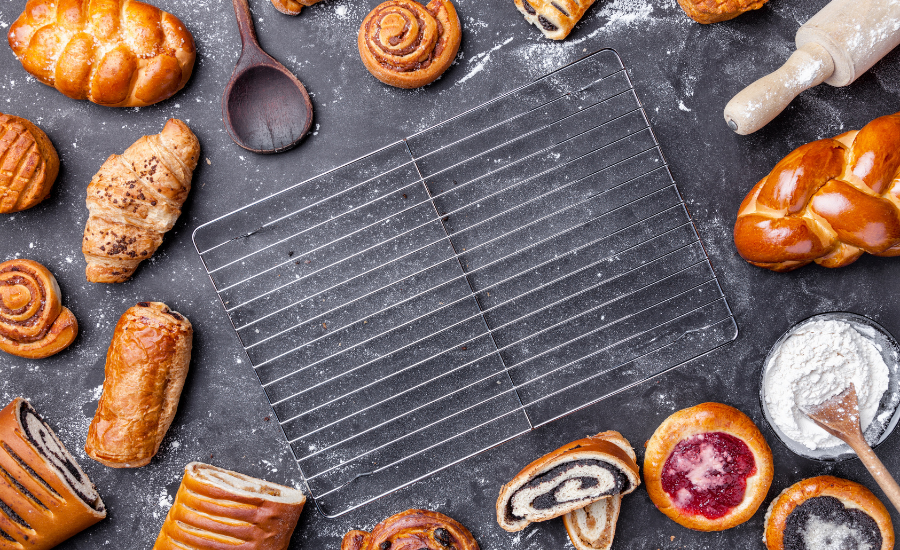
The richness of duck eggs elevate desserts like custards, puddings, and crème brûlée to a whole new level. The yolk’s luxurious texture makes these desserts creamier and more indulgent, with a richer mouthfeel that complements their sweet flavors.
But duck eggs aren’t just for sweets—they add depth to savory baked goods too. Their flavor amplifies savory elements, from quiches to breads, providing a subtle richness that highlights herbs, cheeses, and spices.
For savory recipes where flavor depth is key, duck eggs add complexity and bring out the best in every ingredient.
Baking Techniques for Using Duck Eggs
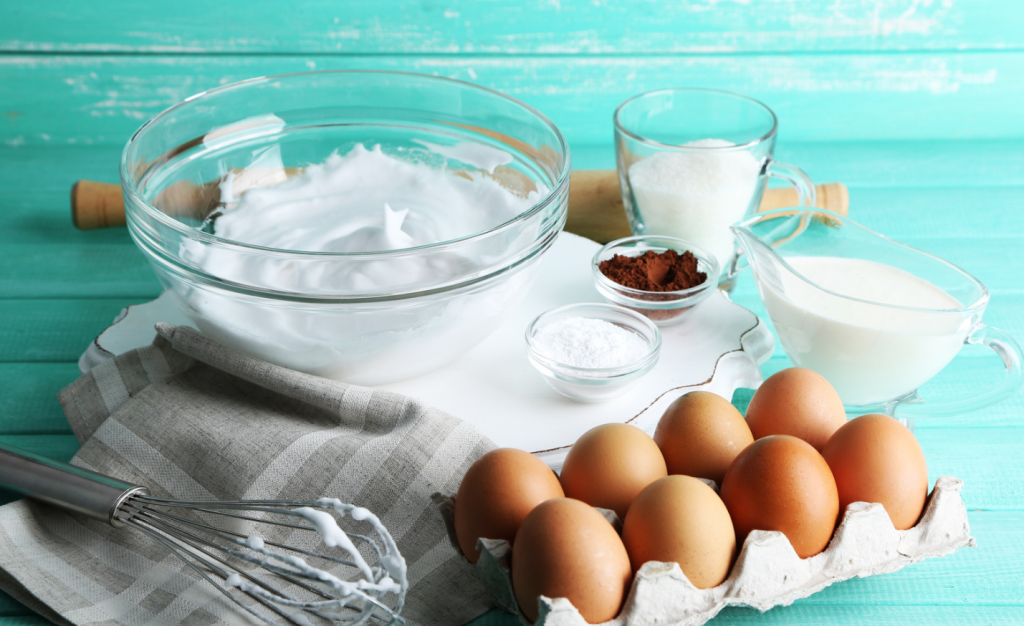
Adjusting Recipes for Duck Eggs: What to Know
Because duck eggs are larger and richer, adjustments to recipes are often necessary. If a recipe calls for chicken eggs, substituting with duck eggs may require slight tweaks. For example, using one duck egg in place of two chicken eggs can achieve similar results in most recipes. Understanding these substitutions is key to unlocking duck eggs’ full potential in the kitchen.
Best Practices for Whipping and Mixing Duck Eggs
Duck eggs have a different viscosity, so they whip and mix differently than chicken eggs. Their thicker whites require a bit more patience when whipping, but they reward the baker with a denser, more stable foam perfect for meringues or soufflés. For the best results, whip at a slightly slower speed, allowing the proteins to develop their full structure.
Tips for Baking Delicate Treats with Duck Eggs
To avoid overpowering subtle flavors in delicate treats like macaroons or angel food cakes, consider reducing sugar slightly, as duck eggs naturally bring a touch of richness and body to the batter.
Health Benefits of Baking with Duck Eggs

Yes, we are covering primarily baked goods, but every recipe can be tweaked to be as nutrient-dense and healthy as possible while still providing a delicious treat — one of those tweaks is using duck eggs instead of chicken eggs. Check out the benefits!
Higher Nutritional Value: Vitamins, Minerals, and More
Duck eggs pack a nutritional punch, offering higher levels of vitamins B12, A, and D than chicken eggs. They are rich in essential minerals like selenium and iron, making them an excellent choice for bakers who prioritize nutrient-dense ingredients. This added nutritional boost makes baked goods made with duck eggs not only delicious but also more wholesome.
Benefits for Keto and Paleo Baking Enthusiasts
For those on keto or paleo diets, duck eggs are a gem. Their high fat content aligns well with ketogenic principles, while the extra protein supports satiety and muscle maintenance. Duck eggs’ versatility also fits well with the paleo philosophy of nutrient-rich, unprocessed foods, making them a valuable addition to grain-free or low-carb recipes.
Duck Eggs and Food Sensitivities: Are They Easier to Digest?
Some people with sensitivities to chicken eggs find duck eggs easier to digest due to differences in the protein structure. Duck eggs have slightly different amino acid profiles, which may reduce allergic reactions in some individuals. This makes them an excellent alternative for those with food sensitivities who still want to enjoy baked treats.
Delicious Baking Recipes and Ideas to Try
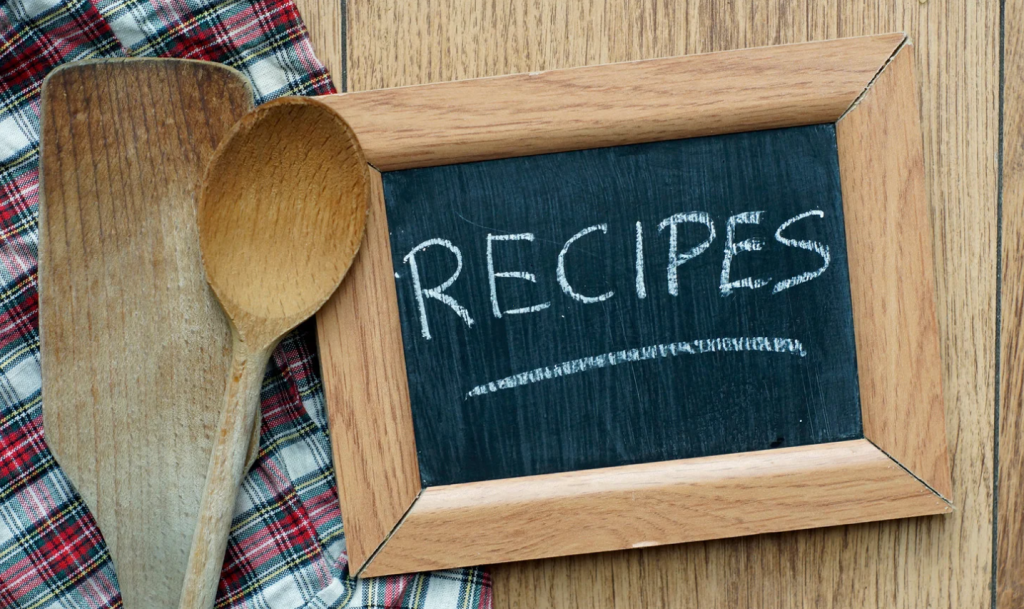
Rich Custards and Decadent Cakes with Duck Eggs
Duck eggs add luxurious density to custards and cakes, making them perfect for rich desserts like flan, crème brûlée and pound cake. These recipes benefit from the additional fat content, resulting in a velvety texture that’s simply irresistible.
My personal favorite dessert is crème brûlée. It’s not the easiest, but I find it to be the most rewarding when the richness of flavor is balanced by a silky texture. Add an evenly torched caramelized sugar crust, and it’s paradise!
Crème Brûlée Recipe Card
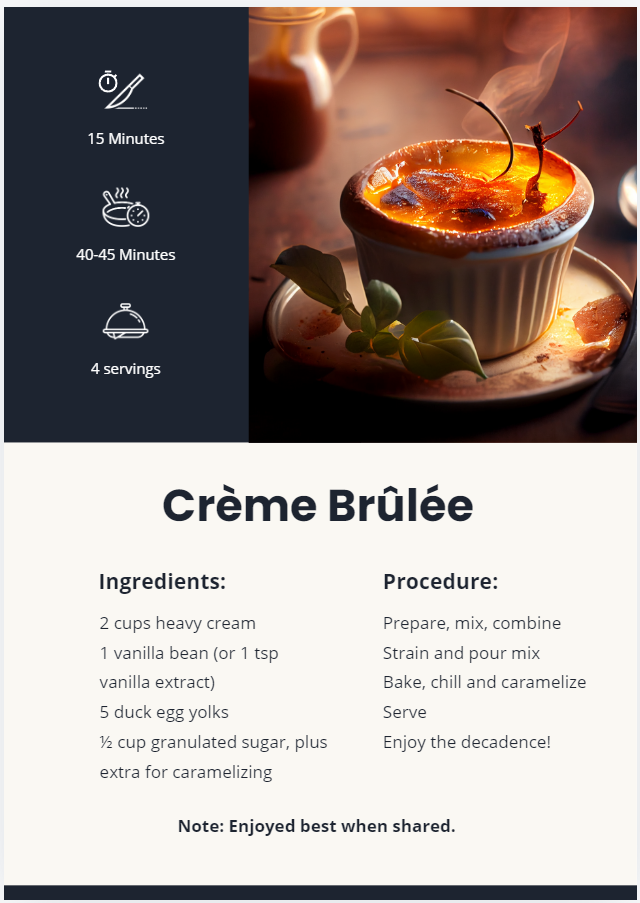
Full Instructions:
Prepare the Vanilla Cream:
- Preheat the oven to 325°F (160°C).
- In a small saucepan, heat the heavy cream over medium heat until it starts to simmer.
- Split the vanilla bean lengthwise, scrape out the seeds, and add both the seeds and pod to the cream (or add vanilla extract if using). Let it steep for 5 minutes, then remove the vanilla pod.
Mix Egg Yolks and Sugar:
- In a medium bowl, whisk the egg yolks and ½ cup sugar until pale and slightly thickened.
Combine Cream and Yolks:
- Slowly pour the warm cream into the egg yolk mixture, whisking constantly to avoid curdling.
Strain and Pour into Ramekins:
- Strain the mixture through a fine mesh sieve to remove any lumps.
- Pour evenly into 4 ramekins.
Bake in a Water Bath:
- Place the ramekins in a baking dish and pour hot water into the dish until it reaches halfway up the sides of the ramekins.
- Bake for 40-45 minutes or until the custard is set around the edges but slightly jiggly in the center.
Chill the Custards:
- Remove the ramekins from the water bath and let them cool to room temperature.
- Cover each ramekin with plastic wrap and refrigerate for at least 2 hours (or overnight).
Caramelize the Sugar Topping:
- Before serving, sprinkle a thin layer of sugar (about 1-2 teaspoons) on top of each custard.
- Use a kitchen torch to caramelize the sugar until it forms a crispy, golden-brown crust. Alternatively, you can broil the ramekins under high heat for 1-2 minutes.
Serve:
- Let the caramelized sugar cool for a minute, then serve immediately for a perfect, crunchy top and creamy custard underneath.
Savory Breads and Muffins: Perfecting the Rise
Savory breads, scones, and muffins take on a new life with duck eggs. Their extra protein and fat content provide a tender crumb with a satisfying bite, enhancing the texture of baked goods that are meant to be hearty yet soft.
I love baking duck-egg muffins — they are especially delicious with cheese, herbs, and veggies.
Savory-Cheesy Herb and Veggie Muffin Recipe Card
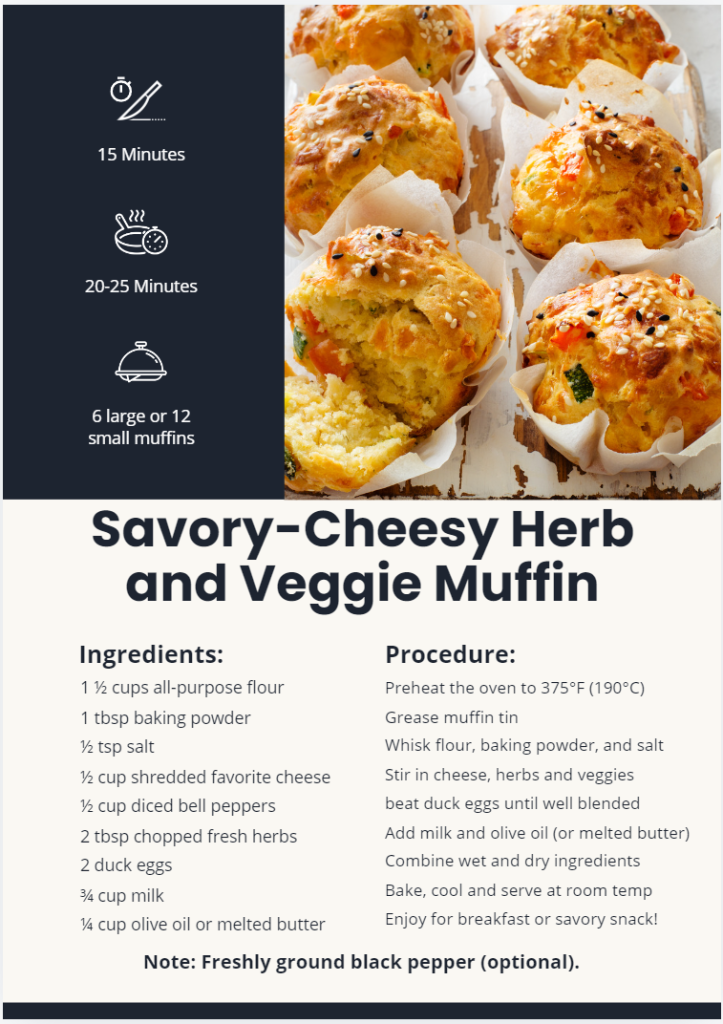
Full Instructions:
Prepare the Oven and Muffin Tin:
- Preheat the oven to 375°F (190°C).
- Grease a muffin tin or line it with paper liners.
Mix Dry Ingredients:
- In a large bowl, whisk together the flour, baking powder, and salt.
- Stir in the shredded cheese, bell peppers, and fresh herbs, making sure all veggies and cheese are evenly coated with flour.
Combine Wet Ingredients:
- In a separate bowl, beat the duck eggs until well blended.
- Add the milk and olive oil (or melted butter), whisking until smooth.
Combine Wet and Dry Ingredients:
- Pour the wet ingredients into the dry ingredients, gently mixing until just combined (do not overmix to keep muffins fluffy).
- Season with freshly ground black pepper if desired.
Fill and Bake:
- Spoon the batter evenly into the muffin cups, filling each about ¾ full.
- Bake for 20-25 minutes or until a toothpick inserted into the center comes out clean, and the muffins are golden brown on top.
Cool and Serve:
- Let muffins cool in the tin for 5 minutes before transferring to a wire rack to cool completely.
- Serve warm or at room temperature. Perfect for breakfast or a savory snack!
Classic Cookies with a Twist: Duck Egg Cookies
Duck eggs lend a chewy, almost fudgy texture to cookies, making them ideal for chocolate chip, oatmeal, and peanut butter cookies. Their yolk adds depth and richness, intensifying the flavors and creating a moist, delicious bite in every cookie.
I can’t help but go with the classic chocolate chip cookie for this one. Everything you love about a rich and just-right balance between chewy and gooey is made easier by using duck eggs. Enjoy the extra depth of flavor that duck eggs bring!
Decadent Chewy Chocolate Chip Cookies Recipe Card
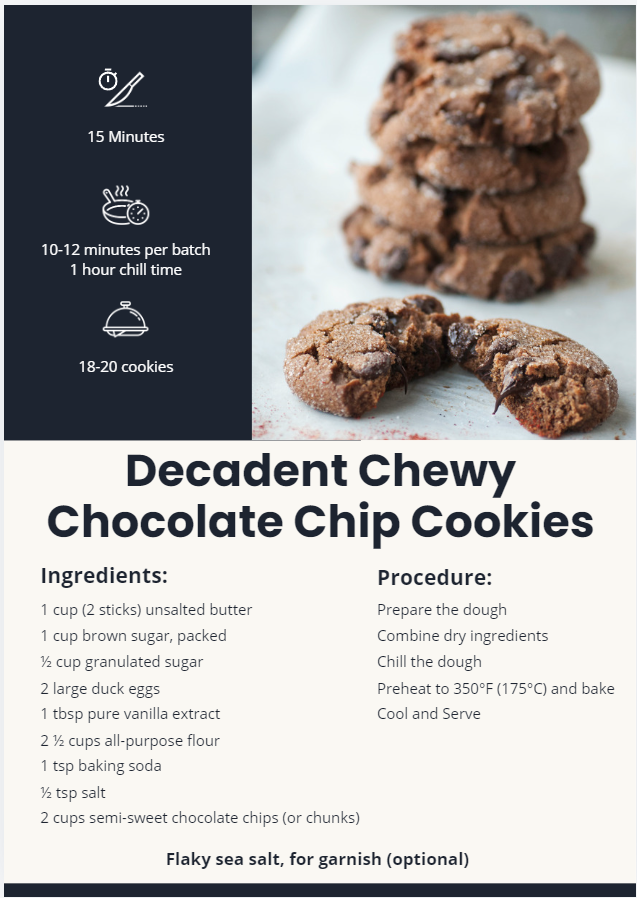
Full Instructions:
Prepare the Dough:
- In a large bowl, mix the melted butter, brown sugar, and granulated sugar until smooth and creamy.
- Add the duck eggs one at a time, beating well after each addition.
- Stir in the vanilla extract until everything is fully combined.
Combine Dry Ingredients:
- In a separate bowl, whisk together the flour, baking soda, and salt.
- Gradually add the dry ingredients to the wet mixture, stirring until just combined.
- Fold in the chocolate chips, making sure they’re evenly distributed throughout the dough.
Chill the Dough:
- Cover the bowl with plastic wrap and refrigerate the dough for at least 1 hour (for best texture and flavor, chill overnight).
Preheat and Bake:
- Preheat the oven to 350°F (175°C) and line a baking sheet with parchment paper.
- Roll the dough into 2-tbsp-sized balls and place them on the baking sheet, spacing about 2 inches apart.
- Bake for 10-12 minutes, or until the edges are golden and the centers look slightly undercooked (they will set as they cool).
Cool and Serve:
- Remove the cookies from the oven and let them cool on the baking sheet for 5 minutes, then transfer to a wire rack.
- Sprinkle with flaky sea salt if desired and serve warm for maximum chewiness.
Where to Find and Store Duck Eggs
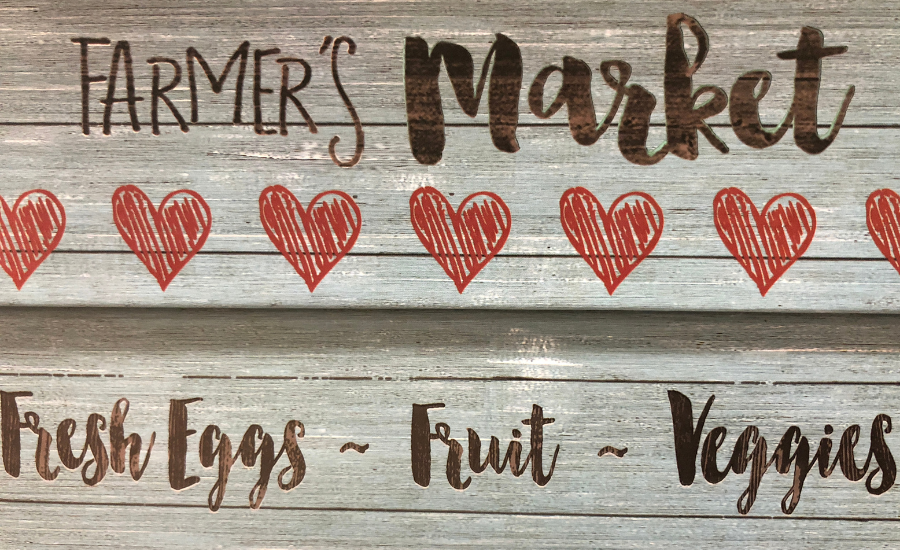
Obviously, nothing can beat raising ducks on your very own homestead. In my previous article, I discussed 7 surprising benefits that make ducks the perfect homestead helpers that go beyond providing eggs.
Finding Duck Eggs: Farmer’s Markets to Specialty Stores
My #1 suggestion if you need to source your duck eggs would be to go to your local farmer’s market, specialty store, or even through small local farms. These sources offer fresher, higher-quality eggs than you’d find in most supermarkets. Some bakers even keep their own ducks to ensure a steady supply. Check out Local Harvest for your closest farmer. Support your local community!
Tips for Choosing Quality Duck Eggs for Baking
When choosing duck eggs, look for clean, uncracked shells and eggs that feel firm. A slightly larger egg with a dark, rich yolk is often an indicator of quality. Organic or pasture-raised duck eggs are ideal for the best flavor and baking results.
How to Store Duck Eggs for Freshness
Duck eggs have a thicker shell than chicken eggs, which means they last longer in the fridge. Stored correctly, they can stay fresh for up to six weeks. For peak freshness, keep them in the fridge in their original carton, which helps preserve their unique texture and taste.
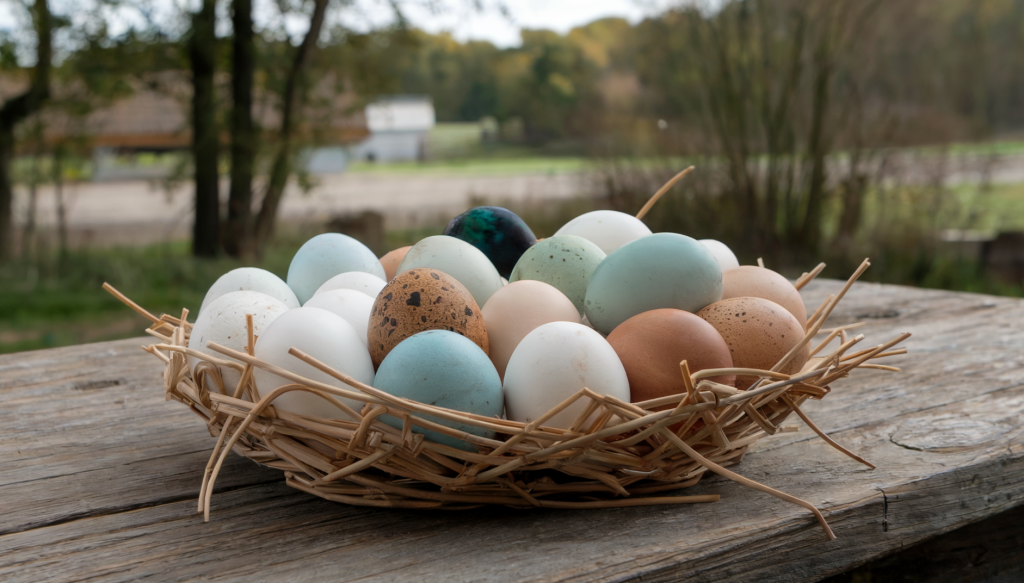
Duck eggs bring depth, texture, and richness to baked goods, transforming recipes in unexpected ways. From cakes to breads, these eggs elevate every bite, creating indulgent textures and flavors that are hard to beat.
Experimenting with duck eggs can open up a whole new world of baking possibilities. Whether you’re looking for extra moisture in cakes, richness in custards, or an alternative for dietary needs, duck eggs add something truly special. Give them a try—you might find yourself with a new favorite baking ingredient!
See Our Latest Posts
- Simple Recipes for DIY Herbal Salves and Balms
- Delicious One-Pot Homestead Meals from Pantry Staples
- 5 Best Meat Dehydrators for DIY Jerky on Amazon (2025)
- Urban Homestead Hacks from Backyard to Balcony
- Creative Strategies for Frugal Homesteading
Write A Guest Post For Us!
Are you passionate about gardening, raising livestock or preserving food? We’re excited to announce that we’re now accepting guest posts for all aspects of homesteading!

